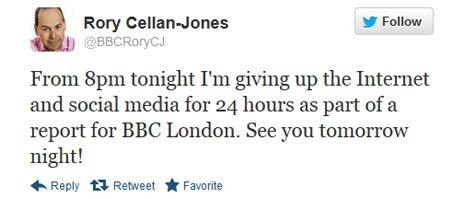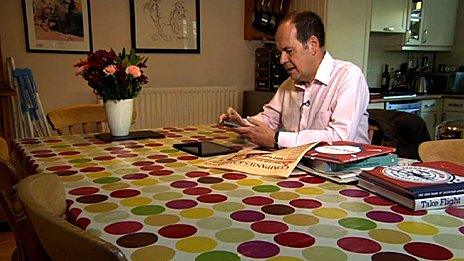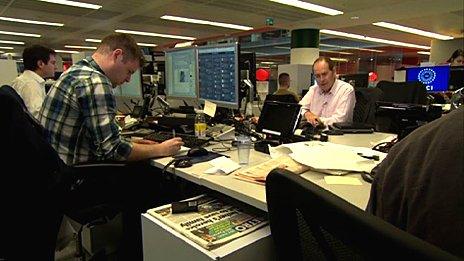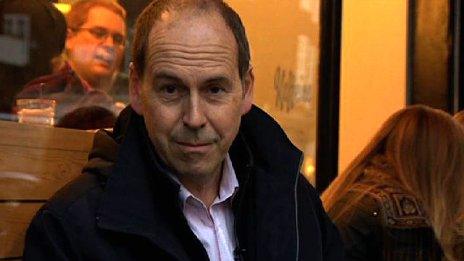My web detox
- Published
- comments
Rory said he found the experience "disorienting"
It seemed like a good idea at the time. As part of BBC London's Lonely London series, I was persuaded to spend 24 hours without using the internet or social media. The thought was to explore whether new technology does anything to make us feel more or less isolated.
Here's how it went...
20:00 GMT
I post messages on Twitter and Facebook explaining that I am going offline, turn on "out of office" on my two email accounts and turn off any data connection on my phone. Then I explain to my 14-year-old son, busy online as ever, what I'm doing. "That would be agony for me!" he says.

23:30 GMT
Later, I realise what a bad time it is for this exercise. It's American election night - the ideal news event to monitor via social media as well as watching on television. Tuning into the coverage, I find it much less compelling without the running commentary I normally get from my Twitter stream, and I go to bed long before the result is clear.
06:00 GMT
The alarm goes off, I reach for my phone - then realise I'm not allowed to look at the web. Turn on the radio to hear the result of the election - and go downstairs to watch Obama's acceptance speech. This time, watching without the distraction of Twitter is a better TV experience.
08:00 GMT
Usually I sit at breakfast with a device or two scouring emails and Twitter and various news sites. This morning I read the papers, then find I have time for the piano practice I usually forget.

09:30 GMT
I have a doctor's appointment - normally I would sit in the waiting room fiddling with my phone. Instead I read a copy of the Economist retrieved from amongst the Grazias and Vogues. It's weeks old, but full of interesting material about technology issues and I emerge from the surgery feeling better-informed.
10:15 GMT
On the tube into London everyone appears to be transfixed by their tablet computers and smartphones. Normally I'm exactly the same - and with wi-fi available at stations I can be checking Twitter at every stop. Instead, I'm reading the paper - which feels many hours out of date. I wish I'd brought a book.
11:00 GMT
In the office, I quickly become aware that not only do I miss the web and social media, but it is impossible to do my job without them. Twitter has become my news agency for technology stories, my main means of communication with people in that field, and an important platform for promoting my content. And when someone rings me with a story, my first instinct is to go to Google to brief myself about the context - then I realise I can't. "I'll email you some background," the contact says. I have to explain why that won't work.
12:00 GMT
What I do manage is a couple of face to face meetings with colleagues, rather than emailing them. And, with little idea of how to carry on my job when offline, I find myself sitting around gossiping - and no doubt annoying busy people who are trying to get on with their work.

14:00 GMT
The psychologist Dr Michael Sinclair comes in to be interviewed by me for our BBC London report. He nods sympathetically as I describe my feelings of being disconnected. We talk about how easy it is to become addicted to social media - and he warns that this can lead to problems in engaging in the real world with family and friends.
15:00 GMT
We go out onto Oxford Street to ask Londoners how they would cope if they had to give up the internet. Just about everyone agrees that it would be impossible now for them to run their lives without it.
16:00 GMT
Later, with a story emerging for the next day, I am reduced to asking colleagues to print out emails and some information from the web. Cheating, I suppose, but the only realistic way of doing my job.
20:00 GMT
At home, and relieved that my self-imposed exile from the online world is coming to an end, I turn on the data connection on my phone and fire up the computer. With a sinking heart I see that 448 unread emails await my attention. Still, there's plenty to catch up with on Twitter before dealing with that - I'm back online and not a moment too soon. I've concluded that I just cannot function without being hooked up to the online world.
Conclusion

That is how it felt at the time. After a few days back online and sometime for reflection, I have come to a rather different conclusion. I now realise that constant connectivity, while vital for my job, has plenty of negative aspects. It shortens your attention span and could prevent you from having any sense of perspective about what is important and what isn't. So maybe a web detox is something we should all try from time to time.
Watch Rory's report on BBC London News at 13:30 GMT on Thursday 22 November, and read more about Lonely in London, BBC London's survey into loneliness and sense of community in the capital.